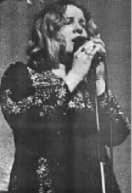Someone recently said that loneliness is the last American taboo. I don’t remember who—heavy drinking and making pop musicians sound articulate has eroded my capacity for details (unless we’re talking about the minutiae of new wave or Broadway show tunes). But I agree. Sexual topics once off-limits anywhere outside the walls of the Kinsey Institute are now the fodder of watercooler chitchat. But loneliness? That subject is practically verboten.
Sure, occasionally some earnest psychologist booked for the tail slot of a talk show will address it, but always in terms of lonelyhearts who can’t get a date, or the involuntarily celibate. That’s loneliness defined as the absence of intimacy. But I’m talking about it on a much deeper level: The sense that you’ll never meet anyone who understands you. The deep-rooted certainty that nobody truly cares if you live or die.
I’ve been dwelling on this topic lately because I desperately need a vacation. My mind, craving culture shock, yearns to visit someplace unfamiliar, exotic: Italy, India, or Thailand. Yet I am perpetually single, all my friends are either married or living from paycheck-to-paycheck, and the prospect of traveling solo in a foreign land intimidates me. I say I don’t want to spend a fortune and fly halfway around the world to climb a mountain in Nepal only to turn around and have no one to share the exhilaration with. But I’m lying. I just want someone who loves me ready to leap to my aid after a rickshaw mows me down because I looked the wrong way before crossing a busy Hong Kong street.
So I keep defaulting to my old standards—New York, Washington DC, Indiana— because I know people in those destinations. Years tick by and my passport sits neglected at the back of my sock drawer. And life seems increasingly small and insignificant. Why should anybody care about me; it’s not like I’m doing anything remarkable.
When you’re younger, it’s easy to romanticize feeling lonely. Up until graduation, I blamed my failure to find soul mates on being stuck in the suburbs. Everything would change after I sprang from the confines of small-town Virginia and moved to a bustling metropolis filled with other artistic individuals like me. So I spent the better part of adolescence seeking solace in songs that reminded me I wasn’t an isolated case: “Camera” by R.E.M., “Mr. Blue” by Yazoo. When my band performed “‘Eleanor Rigby” at talent shows, I wrenched every undue drop of melodrama possible from that sad, simple song.
My favorite soundtrack for those teenage days, when I made Sylvia Plath seem as perky as “Downtown” Julie Brown, was a mix tape compiled by my short-lived first boyfriend, featuring tracks by Randy Newman, Keith Jarrett, and an especially dreary Richard Thompson lullaby called “‘The End of the Rainbow.”‘
But the two tracks I returned to again and again were “Next Time Around” by Sandy Denny and Fairport Convention’s “Farewell, Farewell,” which Denny also sang. Her no-frills, English folk-rock delivery impressed me with its naked vulnerability. I wrapped myself in Denny’s music like other sullen teens delved into Joni Mitchell’s Blue.
My latest round of vacation-related despair timed itself nicely with the release of No More Sad Refrains: The Anthology (on A&M Records). This double CD of Denny’s work spans her early 1968 recordings with Fairport Convention to her final 1977 solo album, issued just a few months before she died of a traumatic head injury suffered after falling down a flight of stairs.
But when I curled up in my glum reverie to listen to the 34-track collection, I heard so much more than the loneliness and sorrow I’d glommed onto in my youth. Denny’s voice was brimming with promise, illuminating songs of joy and wonder that I’d overlooked. “Get off the couch and stop feeling sorry for yourself,” her songs seemed to say. “The only thing stopping you from traveling through Italy with just a backpack is you.”
That night, I came across the following passage in Douglas Coupland’s most recent novel, Miss Wyoming: “It hit him that his own form of loneliness was a luxury, one as chosen and paid for as three weeks in Kenya’s veldts or a cherry red Ferrari. Real loneliness wasn’t something an assistant scoped out and got a good price on. Real loneliness was smothering and it stank of hopelessness.”
Douglas and Sandy are right. I’m too old to try and milk kicks from my garden-variety loneliness. I should book that plane ticket to Rome now. Because there could be a staircase with my name on it just around the next bend.






